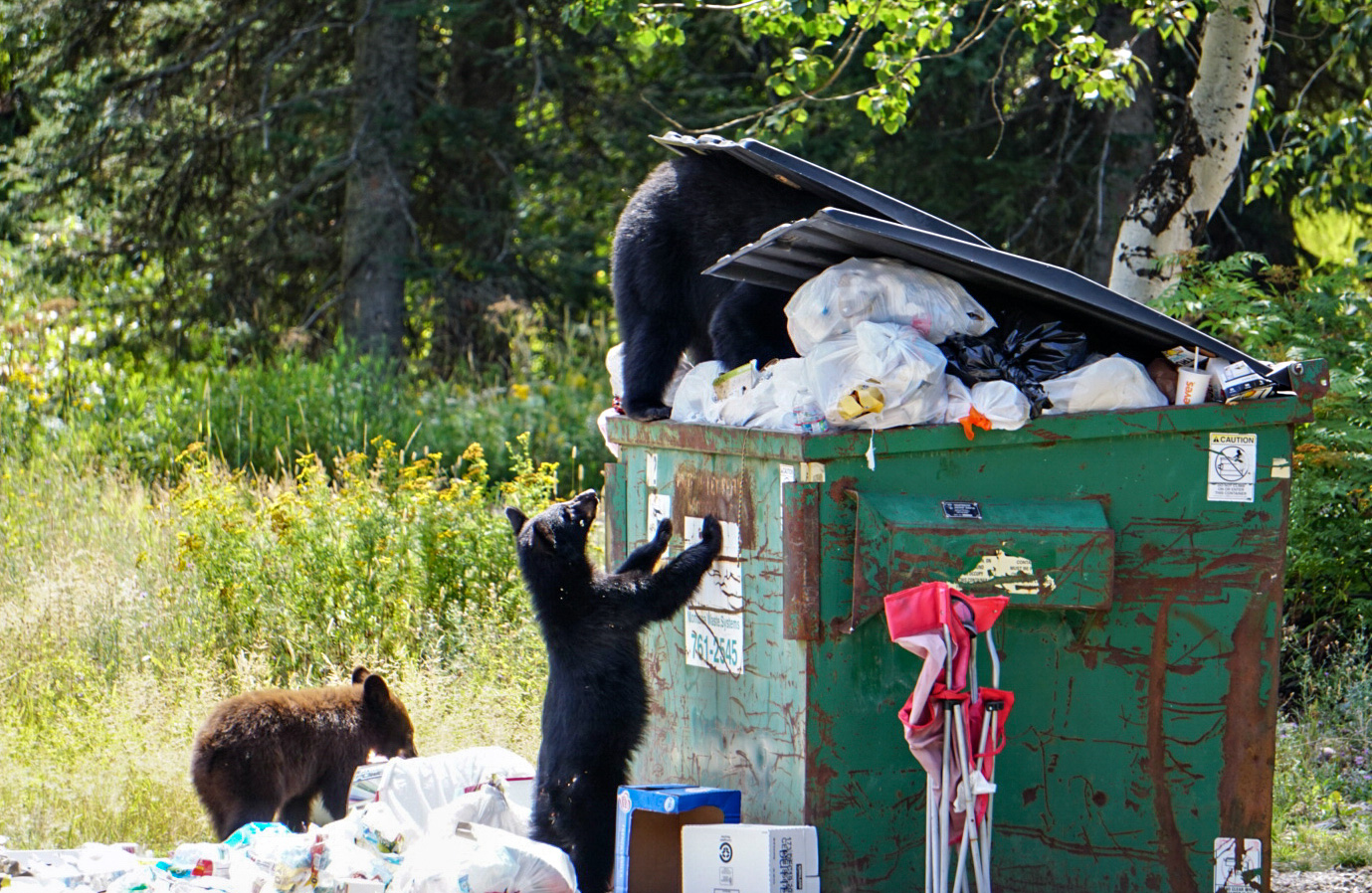Whitefish Poised to Lead State with Animal Resistant Trash and Recycling Program
City council is considering adopting a new curbside recycling program while furnishing all residential solid waste collections with bear-proof cans, albeit at a steep cost
By Tristan Scott
Several of the most prominent challenges facing Whitefish were recently layered into a single policymaking discussion as city leaders laid the groundwork for a residential curbside recycling program that furnishes all homes with bear-resistant containers in order to make room for new affordable housing.
The multi-pronged discussion was born of a need for animal-resistant trash containers following a record year for bear-human conflicts inside Whitefish city limits, where during one extended period in September at least 19 black bears were browsing bins for unsecured garbage and other attractants. The city of Whitefish has an ordinance requiring homeowners to store individual garbage cans indoors until the day of collection or have an animal-resistant container, which are not currently provided to all residential neighborhoods through the city’s service contract. Under the statute, unsecured trashcans cannot remain at the curb in the days prior to a pickup.
However, that arrangement isn’t sustainable as not all residents have indoor storage space for garbage and others, including the influx of new out-of-state residents, don’t abide by the rules. Meanwhile, a greater abundance of bears are using the Whitefish River as an arterial into town.
“You are primed for an incident,” Erik Wenum, the bear and lion specialist for Montana Fish, Wildlife and Parks (FWP), told members of the Whitefish City Council on Dec. 6. “This was a record year for bear conflicts. The problem persists, and it’s not going to go away if it’s not addressed in a timely fashion. I expect next year will be even worse. We have new residents coming here from all over the country that have bad habits. They don’t think of downtown Whitefish as being bear habitat when in fact it is.”
The city’s goal of purchasing animal-resistant trash containers merged with its efforts to improve the recycling program because curbside recycling would also require bear-proof bins.
The city’s current centralized recycling site suffers from overuse and contamination at the corner of Columbia Avenue and Railway Street, on a property now owned by the Whitefish Housing Authority, which is planning to develop the lot for affordable workforce housing.
Rather than search for another site for the centralized recycling program, Whitefish’s Climate Action Plan has identified single-stream curbside recycling as having the most substantial positive impact on community waste diversion. The curbside program will not only result in a higher probability of capturing recycling, which addresses the goals spelled out in the Climate Action Plan, but it also addresses contamination caused by individual customers more effectively than a central site.
A curbside collection program also does not require the construction and maintenance costs associated with developing a new central site, which is estimated at approximately $185,000, according to Whitefish Public Works Director Craig Workman, who noted that the latest agenda item marks the sixth time that council has taken up the matter of recycling in the past year.
However, as Whitefish finally closes in on a curbside collection program and makes improvements to its solid waste collections by purchasing animal-resistant containers for both trash and recyclables, there are steep costs associated with becoming a “bear aware” community, which emerged as the central sticking point at last week’s council meeting.
“I support both curbside recycling and bear resistant containers, but my concern is compounding those two items due to the total increased cost,” Councilor Frank Sweeney said. “We are effectively tripling the cost of refuse disposal for each and every household. For some it might not make a damn bit of difference, but it concerns me that we’re going to be saddling the bulk of our citizens who live here full time with that cost.”
Chad Bauer, a municipal manager at Republic Services who also served on former Gov. Steve Bullock’s Grizzly Bear Citizen Advisory Council, said he has decades of experience working with FWP to improve animal-resistant trash and recycling containers.
“These animal resistant containers have been well tested and they work,” Bauer said, explaining that Republic is prepared to spend $6 million in capital investments to outfit Whitefish with animal-resistant trash and recycling containers.
With an $11 increase to the existing base rate as well as processing fees, the total cost to individual residents would be around $18 per month, Bauer said. That’s $3 a month cheaper than the next nearest bidder for the contract, Bauer said, and Republic Services’ contract includes bear-resistant pickup carts.
Even so, some councilors bristled at the exponential cost increase even as they acknowledge it’s the necessary thing to do.
“That pretty much wipes out the resort tax rebate on my property taxes at a little over $200 a year,” Councilor Steve Qunell said. “But it’s past time to have bear resistant containers in this town. I was just in Colorado and there are bear resistant containers everywhere. And it’s also past time to have curbside recycling in this town. I am glad that we are going to be one of the leaders in our state in terms of doing this because there’s not much better bear habitat out there than right here in Whitefish.”
According to Wenum and Tim Manley, FWP’s bear-human conflict specialist since 1993, the cost of waiting could be much steeper, saying it’s only a matter of time before a mauling occurs.
“Whitefish could lead the way in being a bear aware community in Montana,” Manley said. “Whitefish is one of the few cities in the state that actually has an ordinance to prevent bears from getting into garbage, and by providing bear-resistant containers it would really set an example.”
Whitefish City Council will continue its discussions about the curbside recycling program and bear-resistant containers at its Dec. 20 meeting.